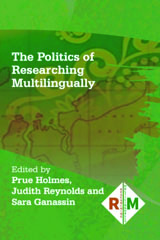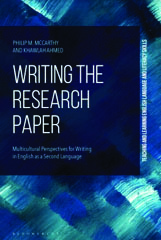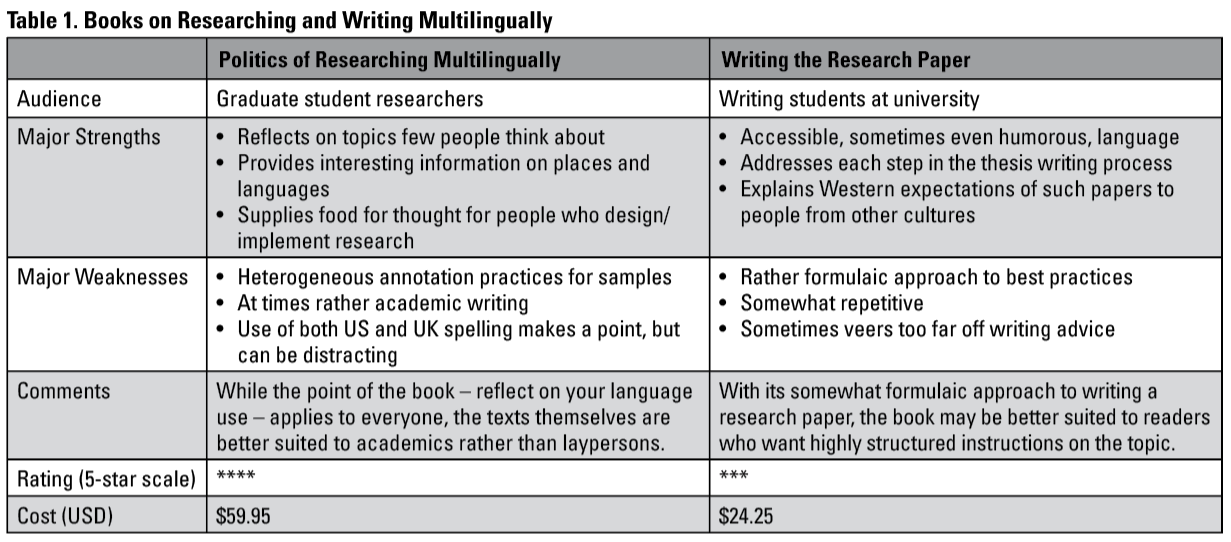INTRODUCTION
Both books in this review target university-level research. The Politics of Researching Multilingually critically questions language use in research—who determines which language(s) to use, what does that mean for power relationships between the people communicating in that language, how should we question our use of linguistic resources. Writing the Research Paper: Multicultural Perspectives for Writing in English as a Second Language is a textbook about producing a research paper when English is not one’s first language. Its detailed instructions are helpful to students who need to write such papers. However, The Politics of Researching Multilingually questions whether such papers should be written in English in the first place.
 The Politics of Researching Multilingually
The Politics of Researching Multilingually
This volume in the Researching Multilingually series collects self-reflections and examples from (mostly) doctoral candidates who are researching language-adjacent topics in a variety of locations—from Kyrgyzstan to Algeria to Canada—among a variety of people—from preschoolers in Mauritius to multilingual teachers in Colombia. Beyond “named” languages, such as English or French, the authors also address linguistic varieties that are not necessarily recognized, such as Gagauzian in a province of Moldova, that mix named languages, such as linguistic practices on San Andres Island in Colombia, or that are non-verbal, such as British Sign Language. The social value placed on specific languages or linguistic practices in these locations is explored, as are the power relations between researchers—who may or may not speak one or more of the local languages—and the people they are researching. Section headers such as “hegemonic structures,” “power relations,” “decolonizing methodologies,” and “decolonizing languages” hint at the theory behind this collection of study reports.
This translator found examinations of how working with a local interpreter influences not only the relationship between researcher and researched, but may shape the research itself, most informative. Critically thinking about which language—or language variety—to use, and when and how to do so, is also helpful in daily life, even for people who speak only one named language. For example, do you speak a local dialect in informal situations and expect someone from elsewhere in the US to understand you? Does that linguistic choice mark you as an “insider” and the person who has difficulty understanding you as an “outsider”?
That’s the message of this book: language—and language choice—matters. How we talk to someone—and which language we choose in a multilingual setting—sets up our relationship with others. While we may often switch languages unconsciously, it is helpful to reflect on some of these situations after the fact. Who got to choose the language of discourse and why? What did that mean for the other person(s) in the communication? Even people who are not linguistic researchers may benefit from such introspection, which could ultimately lead to a more equitable use of language.
Beyond critical reflection, the volume also provides interesting information on locales and linguistic practices of which many people are not aware. In Mauritius, for example, people—even young children—routinely switch between (at least) three different languages: English, French and Mauritian Creole, and more than 21 languages are spoken (p. 133) in this nation of 1.2 million people (https://en.wikipedia.org/wiki/Mauritius).
The volume’s editors suggest that researchers ask themselves whether they acknowledge cultural and linguistic diversity in their research, recognize the multilingual contexts in which they work, and understand the interpreting and translation processes that they use in that work. What do the answers to these questions mean for the researcher’s own integrity?
 Writing the Research Paper: Multicultural Perspectives for Writing in English as a Second Language
Writing the Research Paper: Multicultural Perspectives for Writing in English as a Second Language
This volume in the Teaching and Learning English Language and Literacy Skills series walks university students through the process of preparing a Western-style research paper. It emphasizes the need for critical thinking and devotes significant space to explaining quotation and reference practices to avoid charges of plagiarism. The rest of the book is devoted to the process in sequence, starting with picking a topic and culminating in the final draft of the introduction—which is produced last. The authors teach at the American University in the United Arab Emirates. This volume is written with their students in mind—attending an advanced university-level writing course in their second (or third) language, English. While they are expected to produce university-level writing, little original research is assumed, and the final paper is expected to be 10–12 pages long.
Befitting a textbook, each chapter features an introductory primer and summary of main points. Beyond that format, certain concepts, such as critical thinking questions and honest answers of these, are repeated frequently throughout the book. Suggestions are sometimes also rather formulaic—including recommending the use of “frozen expressions”, such as “In this paper, I argue that ….” (pp. 125–126).
While the authors write that the purpose of a research paper is to persuade its audience, they also argue “Confrontational arguments serve no useful purpose—in life or in writing” (p. 92). Such advice on life seems a bit outside the purview of a writing course textbook. Other advice, such as “neither all positions nor all evidence is equal” (p. 24) would be helpful for journalists and others outside an academic writing course.
The book’s somewhat formulaic approach to the topic may be helpful to students who are less familiar with formal English and with Western expectations of research papers. However, as the first book in this review argues, these are not the only parameters within which research could/should be undertaken or written up.
References
Prue Holmes, Judith Reynolds, and Sara Ganassin, eds. (2022). The Politics of Researching Multilingually. Multilingual Matters [ISBN 978-1-80041-013-8. 392 pages. US$59.95 (softcover).]
Philip M. McCarthy and Khawlah Ahmed. (2022). Writing the Research Paper: Multicultural Perspectives for Writing in English as a Second Language. Bloomsbury Academic. [ISBN 978-1-350-16416-1. 224 pages. US$24.25 (softcover).]


